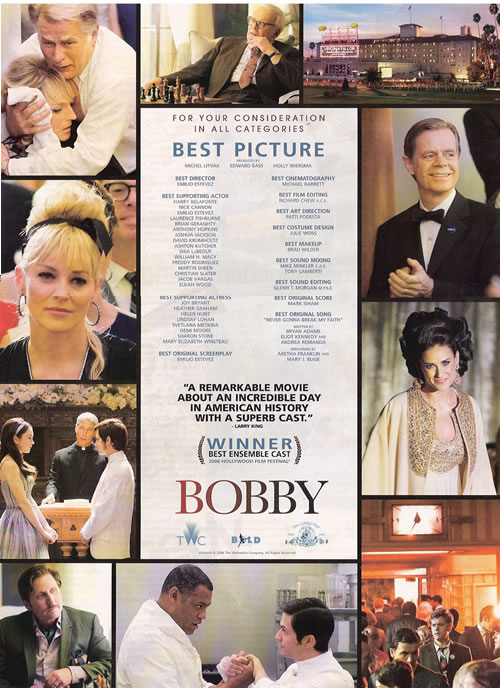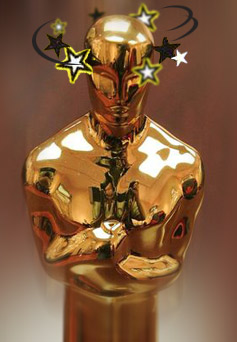 Amir here, to bring you our newest edition of Team Top Ten. Festival season is in full force. Telluride just wrapped. Venice is going strong. And in just two days, Toronto will set the awards season ablaze (Nathaniel and I will be there covering the flames). So we thought we’d vote on something that captures the spirit of the season.
Amir here, to bring you our newest edition of Team Top Ten. Festival season is in full force. Telluride just wrapped. Venice is going strong. And in just two days, Toronto will set the awards season ablaze (Nathaniel and I will be there covering the flames). So we thought we’d vote on something that captures the spirit of the season.
Sort of.
Looking ahead at this point, there are a lot of films that look like surefire Oscar contenders. Inevitably, some of them will miss out on nomination morning, but at this very moment, everyone’s got their hopes high. Even in a year where unfortunate circumstances led to widespread discussion of racism in America, one can’t expect Mandela, 12 Years a Slave, Lee Daniels' The Butler AND Fruitvale Station to be nominated, but all four films are certainly gunning for it. So has been the story with many films in the past couple of decades, since the Oscars became the most glamorous political race on the planet and the Weinstein’s at Miramax supercharged awards campaigning.
We’re looking back today at the films of the past 25 years – let’s call it the Campaigning Era – that looked like major Oscar players this far out in the year, or hell, even five minutes before nominations were announced in some cases, but failed to make a dent of any size. This is Team Experience’s Top Ten Awards Season Flops. Note that this is not a qualitative judgment - some stank, some were superb. But, for one reason or another, they fell short of what The Golden Man deems "Best". In simple terms – borrowed from Team Experience member, Nick Davis – these are the ten films that have the largest gap between their Oscar hopes and their Oscar outcomes. Without further ado…
Bobby and 9 more dashed-hopefuls after the jump...
10. Bobby (2006, Emilio Estevez)
Some guys always get the short end of the stick. Sure, President Kennedy was famously murdered in 1963, but his younger brother Robert met his own violent death before he even got a chance to get elected. And while John F.'s assassination inspired an Oscar-nominated Oliver Stone masterpiece, Robert F.'s assassination inspired, well, Bobby. With its lacquer of Weinstein-packaged, Golden Globe approved prestige (Kennedys! Politics! Civil Rights!), its Altman-lite structure reminiscent of previous Oscar champ Crash, and a glitzy cast that managed to wrestle a SAG ensemble nod through sheer massiveness, Bobby was thought by many to potentially be an awards season inevitability, the kind of ticks-all-the-boxes contender that pulls off a Best Picture nomination despite no one seeming to actually love it (Frost/Nixon, anyone?) But like its title character's presidential hopes, Bobby's awards dreams vanished in a puff of smoke on nomination morning.
Why? Three reasons, I'd argue. First, nothing made by Emilio Estevez as an actor or as a director was well-loved enough to lead voters into over-praising Bobby in the way that Argo was last year. Second, that cast: no doubt a film starring Anthony Hopkins, Demi Moore, Sharon Stone, Helen Hunt and William H. Macy might have given Oscar voters a hard-on in 1996, but by 2006 those names carried more than a whiff of desperation. But more importantly, while the crushing obviousness of Crash was probably one of its biggest assets with Oscar voters (even the most absent-minded viewer could tell it was about RACISM), who knew what the hell Bobby was even about? The political idealism of the 60's? The logistical difficulties of managing a hotel during a campaign? Famous actresses walking around with giant octopuses on their heads? In retrospect, it was all there in the title: hopelessly generic and betraying an overconfidence in the audience's familiarity with its central figure. Because -no disrespect to Senator Kennedy- as far as evocative titles go, Bobby ain't no JFK.
- Julien Kojfer
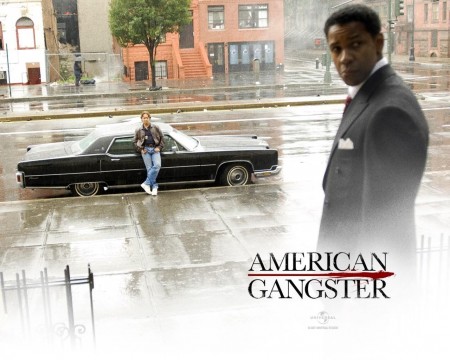
9. American Gangster (2007, Ridley Scott)
Travel back with me in time to 2001. Denzel Washington (Training Day) and Russell Crowe (A Beautiful Mind) were both seeking their second Oscar and it was a true showdown, neck and neck until the finish line. Whether it was the insider Denzel push from Julia "I love my life" Roberts or Russell's BAFTA behavior that decided it, Denzel walked away with his second gold man and Russell just walked away (he was never nominated again). Six years later the one time competitors, teamed up for what would have to be an Oscar event. The story was true (ding ding ding) the setting was period (ding ding ding) and the director was definitely still "overdue" (ding ding ding). But the results were, if hardly embarrassing, underwhelming. Crowe's onscreen fire was down to embers (seriously what happened between 2001 and 2007... it's one long gradual dimming of the light) and Denzel, in "King Kong aint got shit on me" proud criminal mode again, had too recently been rewarded for just that. Perhaps it's worth noting that for all the film's handsome professionalism, literally the only thing I remember was the sudden cold snap from Ruby Dee's angry mama slap. That's (almost) all that Oscar remembered too, despite the hype. Sometimes all you need is to wake people up when a film is weirdly slumbering.
-Nathaniel R
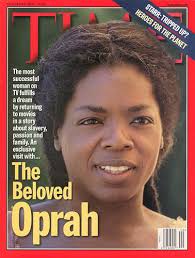 8. Beloved (1998, Jonathan Demme)
8. Beloved (1998, Jonathan Demme)
Everyone crediting Oprah with The Butler's box-office ("See, she can lure anyone to anything!") is obviously not paying attention to the OWN tribulations and has certainly forgotten Beloved, which sank like a stone upon its October 1998 release. The critical reception was not warm enough to turn things around, or even to keep Beloved in the awards conversation as an honorable flop. Its Disney-owned production company (Touchstone) and distributor (Buena Vista) didn't go to the mat with repeated re-releases, the way Paramount kept putting Braveheart into theaters for almost a year to dissipate its aura of box-office disappointment. I don't think audiences were dissing Oprah in general, but a specific Oprah: the one perceived as forcing high-flown literature onto fans of modest reading, and the one who couldn't put a movie into theaters without associated TV specials and coffee table books. She didn't have the book's fans behind her, or even the author: Morrison's an Oprah pal, but when asked about the movie, she complimented the textiles in the costumes. (And that's a part of shade!) The costumes were the only thing AMPAS complimented, too, but in a just world, this uneven but compelling film deserved at the very least to own Best Supporting Actress: Elise, Newton, Hamilton, and Richards are all so indelible in their roles.
- Nick Davis
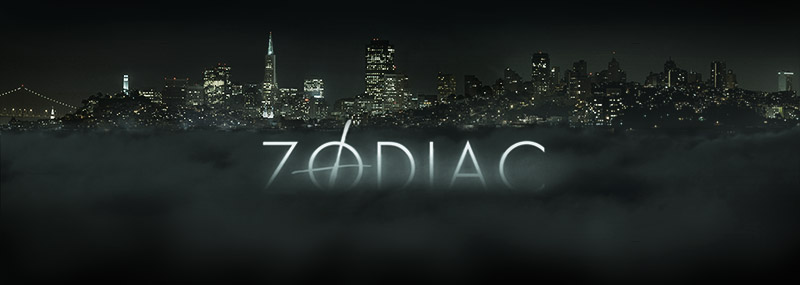
7. Zodiac (2007, David Fincher)
David Fincher's Zodiac, based on the true-life, unsolved case of the Zodiac murderer, was a critical success at the time of its release and went on to appear on countless Top 10 lists at the end of that year. Boasting a cast of Academy Award nominees (Jake Gyllenhaal, Robert Downey, Jr, Mark Ruffalo, and Chloe Sevigny) and a smart screenplay that called to mind the adult dramas studios used to make (Fincher said that All the President's Men was a big influence on the film), it felt like a new direction for the director and the first of his films (following such brilliant but brutal films as Se7en and Fight Club) to seem Academy-friendly. But on Oscar nomination morning, the film failed to receive a single nomination. Perhaps the shock and gore of his previous films still lingered in the minds of voters making them hesitant to reward prior violence. At almost 3 hours in length (contractually, Fincher had final cut) and notorious for doing up to 90 takes per scene, perhaps the thinking was that his hubris was too much too soon and that he hadn't yet earned the right to be so controlling. But I think the main factor was that its March release was too early in the year. Though the campaign was bold enough to address the voters notoriously short term memory what was perhaps more damaging was the public reception. The film never caught on at the box office. It debuted in second place (behind Wild Hogs!!! Oh, America...) and only went on to make $33 million domestically.
Despite the film’s lack of Oscar luck, it set the groundwork for Fincher's subsequent Oscar traction. His next three films (The Curious Case of Benjamin Button, The Social Network, The Girl with the Dragon Tattoo) went on to receive major nominations and earned the director a pair of nominations of his own.
- Andrew Stewart
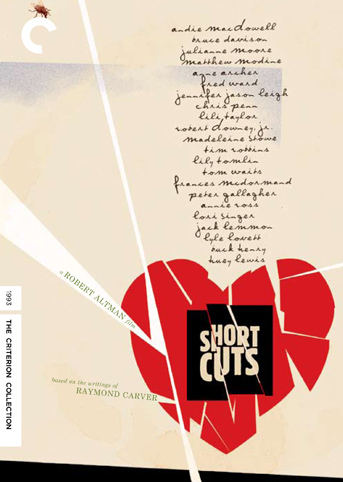 6. Short Cuts (1993, Robert Altman)
6. Short Cuts (1993, Robert Altman)
What was the reason Short Cuts only gathered one Oscar nomination? (A well-deserved Best Director nod for Altman was all it snagged.) This is a film with 22 great lroles played by one of the best groups of actors (and a few singers) Hollywood had ever seen. Just have a gaze at these names: Anne Archer, Matthew Modine, Jack Lemmon, Tim Robbins, Madeleine Stowe, Fred Ward, Julianne Moore, Peter Gallagher, Robert Downey Jr., Jennifer Jason Leigh, Bruce Davison, Chris Penn, Andie MacDowell, Tom Waits, Huey Lewis, Annie Ross and Lili Taylor and Lily Tomlin. That’s a roll call which should’ve reeked of gold. At least at the time.
Why no nods for anyone in this line-up? Maybe the Academy was split as to exactly who to nominate. Perhaps the performances were too subtle, too real and too intuitively conveyed. There were no big, gesture-based scenes of showboat-style speechifying. Everything in the film was too relatable. It wasn’t movie-movie enough, perhaps. But, really, no one here could be easily defined as either lead or supporting. The performances bridge that gap. They all feature intermittently throughout the three-hour running time, each giving us their own slice of LA life. They are a true ensemble, given equal weight and time to show us the length and breadth of a collection of ecstatic, troubled, funny, confused and vibrant Los Angelenos. Maybe they all went under the radar by being collectively exemplary? They won a special ensemble acting award at the Golden Globes two months prior to the 1994 Oscars and won the Special Volpi Cup at Venice, along with three other awards, the previous year. Maybe The Academy should’ve taken note and created an ensemble award just for experiences like Short Cuts. Altman was, as we know, the king of improvisational, ensemble-based organic filmmaking and all his actors and crew here pooled their immense talents in service of telling the stories of Raymond Carver’s people. A sole nod simply wasn’t enough; it required at least 22 more.
- Craig Bloomfield
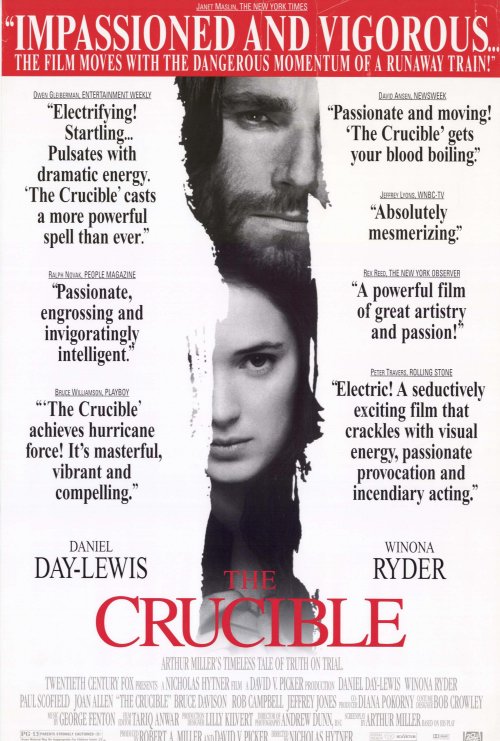
5. The Crucible (1996, Nicholas Hytner)
Like another much ballyhooed Daniel Day-Lewis production, Nine, this stage adaptation felt like a “can’t miss!” Also like Nine, The Crucible was met with a reception that ran from polite to hostile and ultimately failed to live up the reputation of its Broadway kin. While it ultimately received two high profile nominations for Joan Allen’s fantastic performance in supporting actress as well as for the then 71-year-old playwright Arthur Miller’s adaptation of his own work, it’s impossible not to think of the film as an Oscar flop. Maybe it was the coldness with witch Nicholas Hytner directed the material, maybe even Winona Ryder’s divisive performance, but it probably had more to do with the fact that in 1996 the Academy was more interested in new stories and voices (see also Kenneth Branagh’s immaculate 4-hour Hamlet). In this instance, Oscar was right."
- Glenn Dunks
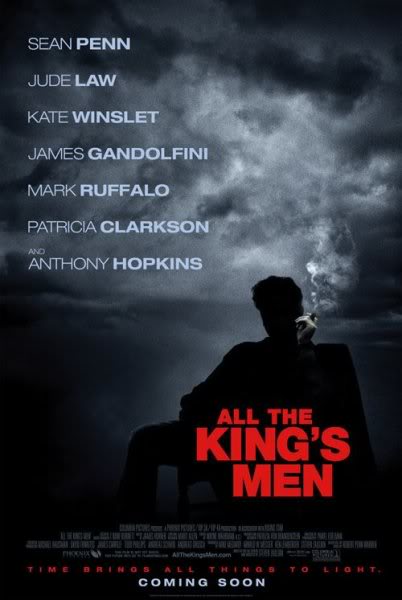 4. All the King’s Men (2006, Steven Zailian)
4. All the King’s Men (2006, Steven Zailian)
Penn. Winslet. Hopkins. Law. Gandolfini. Clarkson. Zaillian. Practically every name attached to 2006's All The King's Men spelled quality - even the name of the film itself. The hugely acclaimed novel by Robert Penn Warren was adapted into a Best Picture Oscar-winning film in 1949. So it's safe to say that, given the pedigree and talent involved, expectations were high for Steven Zaillian's film.
But then it opened.
Despite a few notable dissenters, critics panned it, and audiences listened to them; the film only grossed about $9.4 million. Zaillian, who both wrote and directed the film, seemed to have no control over the tone of the picture, or over his actors, who mostly seemed to be involved in a scenery-chewing contest. In their first Oscar prediction issue, Entertainment Weekly said that the only reason to be concerned about the film's Oscar prospects was the film's delayed opening - it was supposed to open in 2005. Turns out, they should have paid more attention to that warning sign.
- Daniel Bayer
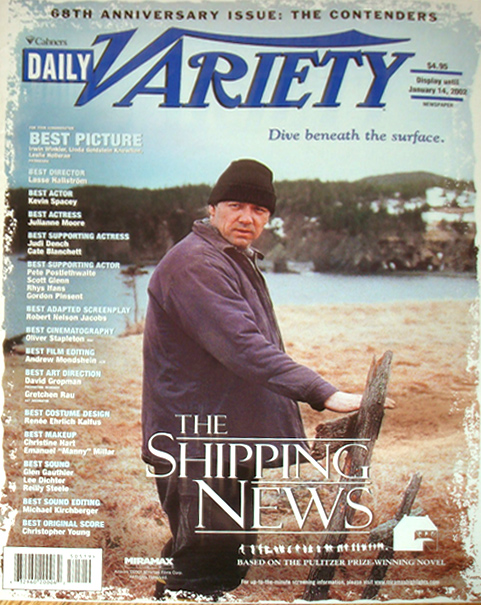 Globe, SAG, BAFTA, and BFCA nomnations of some sort. Nada from Oscar
Globe, SAG, BAFTA, and BFCA nomnations of some sort. Nada from Oscar
3. The Shipping News (2001, Lasse Halstrom)
If Harvey Weinstein raised Oscar campaigning to an art form then The Shipping News was to be his masterpiece. Not only did it star a veritable Avengers of Oscar powerhouses, including Spacey, Blanchett, Moore and Dench, but the film was helmed by Lasse Hallström, who after Cider House Rules and Chocolat was Miramax’s go-to guy for passing off middle-brow pabulum as art films to undiscerning Oscar voters. Problem is, it turns out nobody cares about sad sack Kevin Spacey moping around Newfoundland encountering a series of “Ain’t small town folks kooky?” caricatures on the way to a predictable life affirming ending. For all its perfection on paper, The Shipping News ended up with a big pile of nothing on nomination morning. At least it demonstrated in vivid fashion that no matter what the pedigree or campaign it helps to have a story about which someone might conceivably give a damn.
- Michael Cusumano
2. Into the Wild (2007, Sean Penn)
Hindsight is 20/20, so there always seem to be more explanations after the fact for why sure-fire contenders didn't make it. I've never managed to find a satisfying one for Into the Wild, though, and even though it tops my list I'm still uncertain as to the why. Sure, it wasn't a big hit with the Golden Globes or BAFTA's but with early support from the Broadcast Film Critics, MUCH support from top critics, and important late game support from the DGA and the SAGs (where it was the most nominated film) having it peter out on Oscar morning with only two nominations - for Hal Holbrook and its editing - suggests evidence of a "snub". But, was it snubbed or just unloved? ....or, maybe neither? 2007 was the first year I was following the Oscar race before the nominees were announced and I think the unpredictability of that season is much forgotten. When the nominees were announced on January 22nd every major category had a shocker nomination (or two, or three) and one of the biggest casualties was Into the Wild. But, remember this was the year of the mildly surprising Jolie snub, wondering whether or not the Guild cold shoulder had sunk Atonement, surprise inclusions for Laura Linney and Tommy Lee Jones, etcetera. It’s possible that Into the Wild just ended up being on the unlucky side of each surprise. The editing nomination and the love for Holbrook suggest support but just not enough of it. Considering the pedigree, the all-star ensemble, its respected actor turned director at the helm and a much ballyhooed leading turn, having the reason for Into the Wild's lack of success be so random seems unsatisfactory. But, really, its quasi-shutout might just be the classic example of very bad luck. Each year some film is unlucky number 6 in major categories; poor Into the Wild just got the short end of that stick in 2007.
- Andrew Kendall
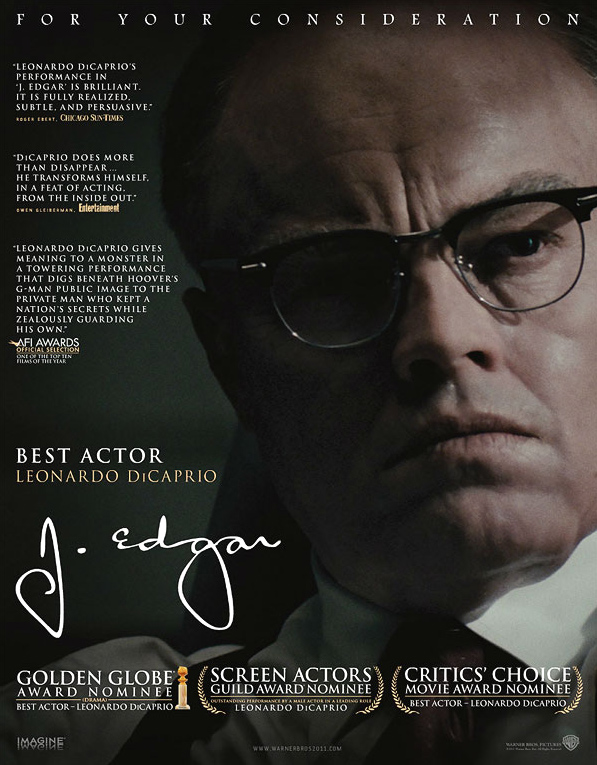
1. J. Edgar (2011, Clint Eastwood)
A director who’d snuggled himself comfortably within the Academy’s bosom (even when the critics started to turn, with Changeling); a lead actor who spent most of the preceding decade marking up “overdue!” notices; a biopic of a Great Man with a closet famously jam-packed with lacy skeletons. That J. Edgar could manage to overcome all of those Oscarbaiting strengths to rack up not one single nomination is perhaps testament to many things – that even the Academy doesn’t like to be outright bullied into giving out statues, for one – but the biggest one of all is surely that the movie is just not that good, and everybody noticed. A movie respected by even a handful of key critics surely wouldn’t have ended up a national punchline on the strength of Armie Hammer’s infamously mummified old-age makeup. But out-of-control latex isn’t nearly the worst sin of this dramaturgically sodden collection of clichéd, harpyish mothers, self-loathing gays, and oppressively dusky interiors filmed with the choking reference of all the most nobly boring period pieces. All the immoderate self-respect in the world can’t overcome a strangled lack of humanity or creativity, and for once, the Oscars wanted more than just another competent, lifeless biopic.
- Tim Brayton

Do you remember these OscarBait stumbles? Which film would you argue should've made this list?
The also-rans
Here’s a list of the films that finished 11th to 20th in that order: Cast Away, Big Fish, Malcolm X, The Majestic, Hoop Dreams, Pay It Forward, Do the Right Thing, Flags of Our Fathers, Radio, Casino, and The Lovely Bones
